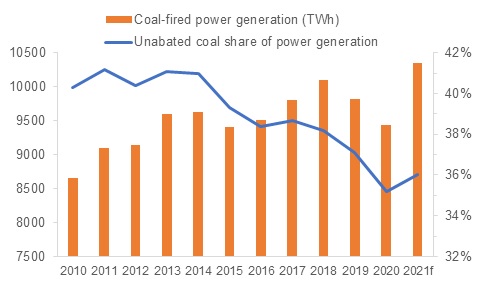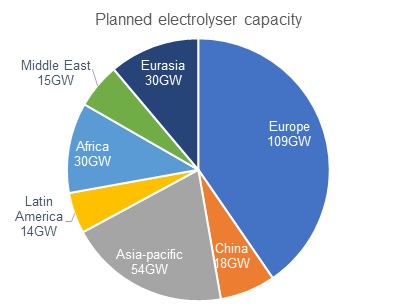16 May 2022
The war in Ukraine is leading to temporarily higher emissions as some countries switch to dirtier fuels and away from politically toxic Russian oil and gas. Over the longer-term however, portfolio managers Velislava Dimitrova and Cornelia Furse believe the conflict will accelerate the adoption of alternative energy solutions. They review the factors they see indicating the growing momentum of the climate movement.
Last month, the UN Secretary General Antonio Guterres warned about the prospect of higher emissions as countries switch to coal and away from politically toxic Russian oil and gas. This follows record high coal-fired power generation in 2021, largely due to the search for cheaper alternatives to high gas prices. This higher coal usage however, while not welcome, is not slowing down the build out of renewables but rather switching away from gas.
The urgency to fight climate change remains paramount. We are behind target in achieving net-zero carbon by 2050 and the switch to coal exacerbates the problem. In the short term, we will see greater use of coal, but the longer-term effect of the war will be that policymakers pursue renewable energy with more urgency. Indeed, we have recently seen significant steps by authorities around the world to speed up the transition to sustainable energy. In past years there has been a steady flow of initiatives around climate change; today, there is material action on a frequent basis, indicating accelerating momentum to deal with global warming.

Source: Statista, IEA, 2021.
Last month, the US Securities and Exchange Commission (SEC) proposed new rules that would implement mandatory climate-related disclosures, making emissions reporting as common as earnings figures in the financial statements of US-listed companies. If these measures are accepted, this would create a standardised disclosure framework leading to consistency and quality in emissions reporting from corporates, enabling investors to more accurately inform investment decisions. The market would be better able to discern between the laggards and leaders in sustainability and companies would face greater pressure to act on climate. The SEC’s proposals symbolise how mainstream climate awareness is becoming, and they follow the EU’s lead on corporate sustainability disclosures unveiled last year.
More recently, the EU recently released its REPowerEU plan for greater use of renewable energy and a faster reduction in the use of fossil fuels. The EU also wants to move towards a circular economy and in March it proposed a series of legislative changes that should cause products to last longer, be more easily repairable and make production cycles less energy intensive. The plans are wide reaching and include extending standardised energy labels, which are already mandatory for when washing machines and refrigerators, to a much broader range of products. A product passport will create more transparency around the supply chain and there will be a certification system for labelling items as "sustainable" or "environmentally friendly" etc.
China accounted for 28% of global carbon emissions in 2020 so its decarbonisation strategy is crucial. In its latest 5-year plan (2021-2025) announced in January, provincial authorities must submit emissions reduction plans and its central bank is piloting green finance schemes and mandatory environmental risk disclosures. China has also launched a carbon trading scheme for the power generation sector, which contributes 40% to national emissions. The State Council’s roadmap for decarbonisation details its comprehensive framework, and although there is criticism that it doesn’t take enough short-term action, it is clear that the country is serious about the challenge and building a long term foundation for deep reductions in emissions.
These recent policy moves towards greater environmental sustainability are taking place in a culture increasingly embracing the fight against climate change. We have been following the climate debate for nearly 14 years, and the difference between 2008 and today is stark, far exceeding most people’s expectations.
In 2008, technologies such as electric vehicles and green hydrogen seemed like far off futuristic solutions, out of reach for perhaps a generation and readily dismissed. EVs were seen as expensive and heavy, had inefficient batteries, fleets were thought to put too much pressure on electricity grids, and building a full-scale charging infrastructure was considered almost impossible. Some magazine articles even predicted the demise of the technology and a 2006 documentary film, Who Killed the Electric Car? attempted a post-mortem of the industry. But the naysayers were hasty. A follow up film in 2011, Revenge of the Electric Car, followed a younger Elon Musk in his bid to launch the Tesla Roadster, an ambition that triggered the wider commercialisation of EVs.
While hydrogen technology has been operational for decades, it is yet to become mainstream because the cost to produce ‘green hydrogen’ (emission free hydrogen) is high, and the infrastructure to store and transport it still needs to be developed. But after many false starts, it looks like hydrogen power will take off.
The growing number of countries targeting net zero emissions means that they will need hydrogen power to decarbonise processes that standard electrification cannot reach. Trucks and lorries can benefit from liquified hydrogen’s much higher energy density than that of lithium-ion batteries, which are too bulky and heavy for commercial vehicles. Shipping, heating, steel and cement production could all adopt hydrogen.
Green hydrogen, which is produced using electrolysers, needs to be cheaper. But just as wind and solar power were supported by governments through subsidies and tax breaks to become economically competitive, green hydrogen would benefit from similar assistance. Globally, around US$65 billion has been allocated to hydrogen over the next decade including US$30 billion in government subsidies.
The Hydrogen Council forecasts that the cost of hydrogen production, storage, distribution and utilisation in a wide range of applications should decrease by 50% by 2030, and 22 of the 35 applications of hydrogen analysed would be cost competitive against other low-carbon alternatives. In terms of capacity, the IEA estimates that planned project pipelines in over 30 countries will boost global electrolyser capacity from 0.3 GW in 2020 to nearly 17 GW by 2026. In the longer term, announced electrolyser projects as of October 2021 had reached over 260 GW.

Source: IEA, December 2021.
On this day six years ago, the Paris Agreement was signed. While the treaty has faults - it’s not sufficiently binding on states and current pledges for emissions reductions are not ambitious enough - it has set a specific target on global warming, committed countries to developing climate plans and reporting, and become more inclusive of developing countries compared to the 1997 Kyoto Protocol. The accords provide a financial, technological and capacity-building framework to cut emissions. It has even enabled successful climate litigation to force countries and companies to bolster climate action.
The Paris Agreement also had another major impact that should not be underestimated: with 195 countries signing the treaty, it brought huge global publicity to the climate agenda. But perhaps more impactful on the public’s consciousness of climate change was the actions of a schoolgirl from Sweden.
If the Paris Accords was a quantitative milestone, Greta Thunberg activism was a qualitative one. Thunberg’s blunt speaking manner and fearless challenge of political leaders transformed her solitary protest outside the Swedish parliament into a global movement. Within a few months, over 20,000 students were protesting in over 270 cities. Her viral Fridays for Future campaign and demand for inter-generational justice have established her as an inspirational youth figure.
Thunberg has won numerous accolades and entered popular culture, and her influence on society’s awareness about the climate emergency has been dubbed the “Greta effect”. Thunberg’s impact has even been the subject of academic articles. A whole generation of younger people are now pushing their parents to act and will be life-long activists as a result of Thunberg’s stand.
We should be careful not to become complacent about climate change but it’s right to recognise the progress made. Today, we have global acceptance of the climate science - this wasn’t the case a decade ago - and dozens of governments have adopted emissions reduction targets. We have developed excellent technologies that can do most of the decarbonisation work and there are brilliant innovators working on developing and scaling these solutions. Not only must policy be supportive, but the economics of decarbonisation must work for solutions to be competitive and reach full penetration.
The investment industry is increasingly playing its part, supported by climate conscious investors. The general population, particularly younger generations, are acutely aware of what’s at stake and increasingly putting pressure on governments to act. There is still much to do, and we are behind schedule to achieve net-zero by 2050, so the transition needs to accelerate. As a result, it’s important to maintain pressure on policymakers and organisations to lower emissions.
But we think confidence in the momentum towards climate sustainability is justified and we are moving in the right direction. The progress made over the past 14 years has been underestimated and given the increasing momentum in the fight against global warming, we believe the coming years will similarly outdo expectations.
Important information
This information is for investment professionals only and should not be relied upon by private investors. Past performance is not a reliable indicator of future returns. Investors should note that the views expressed may no longer be current and may have already been acted upon. Changes in currency exchange rates may affect the value of investments in overseas markets. Investments in emerging markets can be more volatile than in other more developed markets. A focus on securities of companies which maintain strong environmental, social and governance (“ESG”) credentials may result in a return that at times compares unfavourably to similar products without such focus. No representation nor warranty is made with respect to the fairness, accuracy or completeness of such credentials. The status of a security’s ESG credentials can change over time. Reference in this document to specific securities should not be interpreted as a recommendation to buy or sell these securities and is only included for illustration purposes.